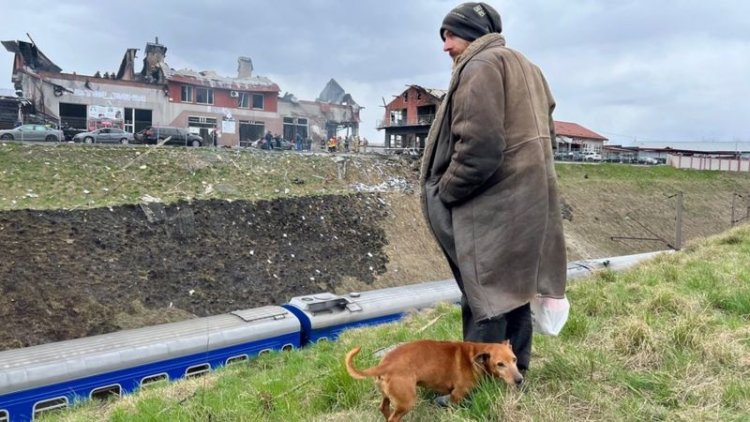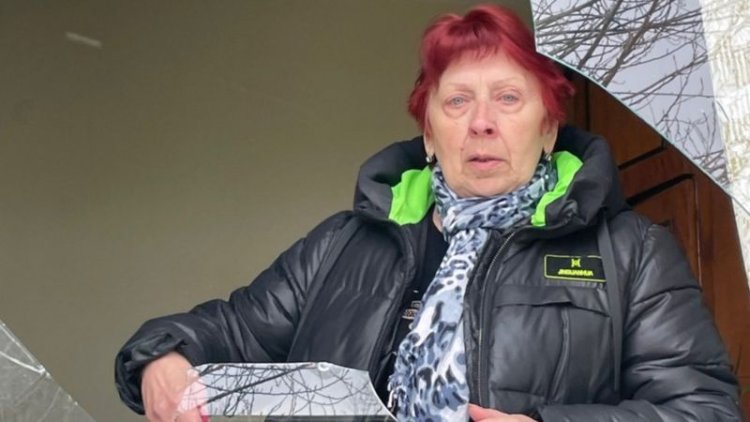The first civilian killings in Ukraine's war in Lviv have shattered any illusion of security.
Officials said the missiles struck three warehouses and a car garage, where a group of colleagues had gathered for a coffee before work.

According to officials, the western Ukrainian city of Lviv, which has so far escaped the brunt of the conflict, has registered its first civilian casualties as a result of Russian strikes.
According to the city's mayor, at least seven people were murdered and 11 more were injured in the early morning attack on Monday, with the death toll expected to grow as emergency crews clear the rubble.
Following weeks of strikes in towns such as Kyiv, Kharkiv, and Mariupol, tens of thousands of Ukrainians have fled to neighboring Poland through Lviv.
However, Mayor Andriy Sadovyi told reporters that the morning strikes demonstrated that Ukraine now has "no safe and unsafe sites."
"Everyone is in danger," he continued.
Russia has said it plans to focus its forces in the east - an attempt to capture the industrial area on the border known as the Donbas - after Ukraine held off its attempt to take the capital Kyiv, in the north.
This is why the strikes in Lviv - which is hundreds of miles from the front line in the east - came as a surprise and left many residents in shock.
"When we see it in Mariupol when we see it in Kharkiv, we see it through the prism of a great tragedy," Mr... Sadovyi told the BBC. "But when it happens at home people see it through the loss of the person - that you have seen and that you worked with just 30 minutes before."
Officials said the missiles struck three warehouses and a car garage, where a group of colleagues had gathered for a coffee before work.
Yury Baran - who worked in IT at the garage - was among them.
Later, his parents Anatoly and Maria arrived at the site of the attack which is now surrounded by ruined cars and debris. They hadn't been able to get through to their son, who was less than a month shy of his 27th birthday.
Now, those helping sift through the rubble told them the worst news: he had died in the attack.
"Humans cannot do such things. They are not humans, they are barbaric invaders," Anatoly said of the Russians.
Valya has lived in a building near the construction site since she was a child. The 70-year-old woman heard the sirens shortly before 8:00 a.m. local time (06:00 a.m. BST) but ignored them, assuming she was safe.

She was knocked to the ground by the explosion. "I was terrified," she admitted. "Everything was trembling, and every piece of glass had shattered."
She strolled into the street in a stupor, still wearing her pajamas until a neighbor called at her to get to the basement.
"My heart was racing," she admitted. "I'm happy it wasn't a rocket and not a [shockwave]."
Olena, who lives upstairs in the same block, said she took her dog Valdo to the kitchen for safety after hearing the explosion." The explosion was so loud I thought it hit my house," she said. "I'm lucky."
Following the strikes, Mr. Sadovyi told the BBC that residents in his city would now take air raid sirens more seriously. While the Russians have targeted the Lviv region before, injuring five civilians in a strike in March, these are the first reported civilian casualties in the city proper.
"I don't think Lviv residents will question whether I should go to the basement or not after today," he said.
Tatiana was waiting for a bus when the Russians attacked. She, like others, couldn't realize the city was under attack; at first, she assumed it was a gas explosion.
She called the attacks "inhuman," claiming that national elites make decisions while ordinary citizens "die for nothing."
"It scares me a lot. It's wrong," she said. "This is a great sin."
The strikes damaged the country's sense of security in the west. On Sunday, the number of people crossing from Poland surpassed those leaving Ukraine for the first time since the crisis began, and some of the refugees we spoke with are now returning home after fleeing the country's east.
Civilians, humanitarian organizations, international diplomats, and journalists have sought refuge in the city. Officials recently extended the curfew until 23:00 local time, and clubs and churches in the city center were packed over the weekend.
Myroslava, who was passing past the blast site as firefighters battled billowing, black smoke streaming from a rooftop, told us she could hear the explosion from 1.5 kilometers away, echoing the sentiments of everyone caught up in Russia's invasion.
"We're nervous, we're empty on the inside - why are we here?" she said, her eyes wide and her palms up in despair. "We have no idea what it's all about."

 Boakyewaa Lawrencia
Boakyewaa Lawrencia 


































